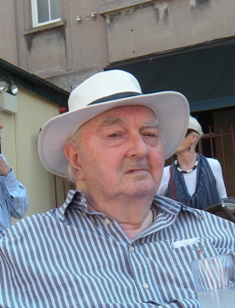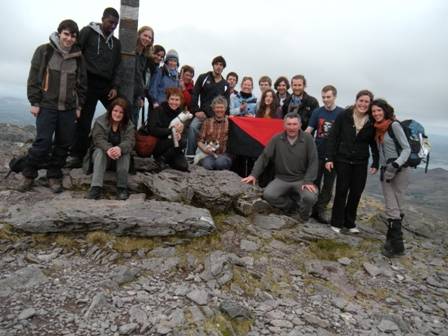Over 30 years of anarchist writing from Ireland listed under hundreds of topics
Kevin Doyle
OBAMA - change you can’t believe in
 The election of Barack Obama to the White House in 2008 was one of the most celebrated electoral victories of recent times. Not since Nelson Mandela’s win in South Africa, following the collapse of the Apartheid regime, was the supposed power of the ballot box so publicly celebrated and displayed.
The election of Barack Obama to the White House in 2008 was one of the most celebrated electoral victories of recent times. Not since Nelson Mandela’s win in South Africa, following the collapse of the Apartheid regime, was the supposed power of the ballot box so publicly celebrated and displayed.
Obama’s victory was hailed as a triumph for the ‘democratic process’ and was widely touted as a fine example of how people power and electioneering can trump entrenched bigotry and money.
A promise broken: Obama & Guantánamo Bay
 The Guantánamo Bay detention facility was created under George Bush’s Presidency in the aftermath of the attack on the World Trade Centre in New York in 2001. Described as ‘a place where normal legal rules’ do not apply, it quickly became infamous for harsh and extreme conditions of detention. Interrogators practiced a variety of torture techniques on prisoners at the facility including the now well known water-boarding procedure.
The Guantánamo Bay detention facility was created under George Bush’s Presidency in the aftermath of the attack on the World Trade Centre in New York in 2001. Described as ‘a place where normal legal rules’ do not apply, it quickly became infamous for harsh and extreme conditions of detention. Interrogators practiced a variety of torture techniques on prisoners at the facility including the now well known water-boarding procedure.
Patrick Galvin - renowned poet and socialist has died

Patrick Galvin, the renowned Cork writer and socialist, has died. Born in Margaret Street in Cork in 1927, Paddy was a prodigious and accomplished writer producing many works in poetry and drama, as well as writing the memoir The Raggy Boy Trilogy. He was also a most accomplished balladeer and many of his early works were in this form.
(Image: Patrick Galvin at his birthday party last summer).
Clarion hotel in Cork and Davenport in Dublin: Fighting for solidarity the key
T he attack on workers at the Davenport Hotel in Dublin had highlighted the greed and bullying in the hotel business. A similar case to that at the Davenport has come to light here in Cork. But so far fear has ruled the day.
he attack on workers at the Davenport Hotel in Dublin had highlighted the greed and bullying in the hotel business. A similar case to that at the Davenport has come to light here in Cork. But so far fear has ruled the day.
The Clarion describes itself as one of “Cork’s premier 4 Star City Centre Hotels”. Although it’s well able to charge for its rooms it cannot find its way to granting its workers a 29 cents per hour pay rise.
Anarchists Reach Highest Mountain in Ireland! 'Red and Black' raised on Carrantuohill Mountain for Solidarity Books, Cork
 Anarchists, along with the Rebel Hill Walkers and lots of supporters, climbed Carrantuohill in Kerry on Sunday as part of a fundraiser for Solidarity Books in Cork. Guided by the esteemed and experienced James McBarron, the large group set off shortly after 11 am. A number had to turn back for health reasons, but the majority headed on to establish ‘base camp’ under the summit at around 3.30 pm – delays and picnics were the order of the day – ahead of the final assault on the peak.
Anarchists, along with the Rebel Hill Walkers and lots of supporters, climbed Carrantuohill in Kerry on Sunday as part of a fundraiser for Solidarity Books in Cork. Guided by the esteemed and experienced James McBarron, the large group set off shortly after 11 am. A number had to turn back for health reasons, but the majority headed on to establish ‘base camp’ under the summit at around 3.30 pm – delays and picnics were the order of the day – ahead of the final assault on the peak.
“Reconfiguration” and “Centres of excellence” - Buzzwords for Privatisation - St. Mary's Orthopaedic Hospital, Cork
 Brendan Drum of the HSE had earmarked the St Mary’s Orthopaedic Hospital in Cork as next in line for his cuts. But workers at the hospital are intent on fighting back and not accepting this. Kevin Doyle interviewed Paula Walters, SIPTU member, and a hospital attendant with over 30 years experience at the hospital.
Brendan Drum of the HSE had earmarked the St Mary’s Orthopaedic Hospital in Cork as next in line for his cuts. But workers at the hospital are intent on fighting back and not accepting this. Kevin Doyle interviewed Paula Walters, SIPTU member, and a hospital attendant with over 30 years experience at the hospital.
No Mercy Points To Solidarity - Cork's Mercy Hospital
In a timely statement on May 1st, nurses in Cork city's A & E service poured scorn on the HSE. Part of the reason why they did this was because of the ongoing situation at Cork's Mercy Hospital. In their statement, the nurses said that it was their "collective view that patient care is being compromised and that it is only a matter of time before there are serious issues and incidents ..." A month on from that statement there has been no resolution in the Cork area. The Workers Solidarity Movement look at the issues and how the impasse could be resolved.
Cronic state of Irish health system
In January 2005, Michael X, a courier driver, went to see his GP complaining of recurrent diarrhoea and passing some blood. Following an examination, his GP sent a letter to arrange for an appointment with a gastro-enterologist for specialist assessment. His appointment arrived in the post - he could see the consultant in July, six months later.
The Third History – What Happened To Captain Jack White’s papers?
“The Burning” – PDF here– is a full length play written about the circumstances surrounding the destruction Captain Jack White’s papers following his death in Broughshane, Co. Antrim in 1946. White, as many people will know, was one of the more well known figures in Irish history that identified with anarchism. The only son of British Boer War hero, Sir George Stuart White (“The Hero Of Ladysmith”), he was assured a bright future in the upper echelons of the British military until his conscience intervened and he resigned his commission.
What causes low wages - Unequal power, unequal pay
During the year a spate of reports have 'discovered' what a lot of workers already know - that equal pay for equal work just doesn't exist. Although legal victories and a raft of employment equality legislation have made some dents, the fact remains that discrimination on the grounds of gender, ethnicity and age (to name just a few) persists and is widespread. It seems obvious to ask: why?

